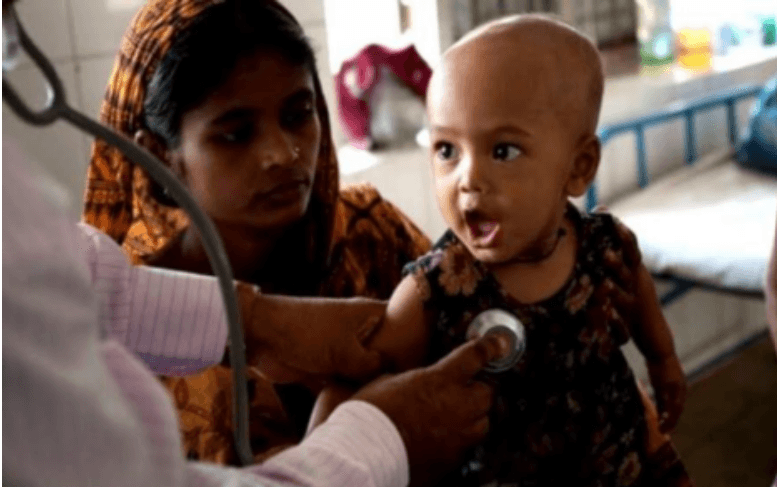Improving maternity and child health (MCH) is a tough but necessary undertaking if Bangladesh is to undergo reform and its inhabitants are to have a better future. Maternal and child health remains a pressing issue in Bangladesh. High levels of illiteracy among women and significant socioeconomic challenges hinder progress in this critical area.
Despite improvements in healthcare access over the years, many women still face significant barriers. Limited access to quality healthcare, socioeconomic disparities, and cultural norms often impede women’s ability to receive the care they need during pregnancy and childbirth.
The reality is stark maternal mortality rates remain high, and many children suffer from malnutrition and preventable diseases.
A glimpse of persistent problems
The vast majority of maternal deaths occur in low-resource settings, and most could have been prevented. Over 290,000 women died of maternity-related causes in 2017. Most maternal deaths are caused by preventable conditions such as:
● Post-partum hemorrhage (blood loss after birth)
● Eclampsia (seizures or convulsions) or pre-eclampsia (increased blood pressure)
● Pre-eclampsia (increased blood pressure)
● Puerperal sepsis (infections following childbirth)
● Complications from unsafe abortion
● Obstructed labor
Young adolescents face a higher risk of complications and death as a result of pregnancy than other women. Between 2000 and 2017, maternal mortality worldwide dropped by about 38%. Each year, 2.4 million neonates die globally, mostly from preterm birth, birth asphyxia, or severe infections and nearly 2 million babies are stillborn.
In Bangladesh, In 2017, there were 5,100 maternal deaths, down from 15,000 in 2000. The maternal mortality ratio, deaths per 100,000 live births, has fallen from 434 in 2000 to 173 in 2017. Some 77,896 children under five years of age died in 2019.7,8There were around 52,624 neonatal deaths in 2019.
An interview: To find the struggles a mother has to face during maternal life, we conducted an interview with a rural mother named Sufia who gave birth to four children.
Interviewer: “Sufia, could you tell me the experience during your pregnancy period?”
Sufia: “I already have three children at this young age. But during my first pregnancy, I didn’t know about antenatal care. I didn’t go to any doctor to get checked up, and I gave birth at home.”
Interviewer: “What kind of obstacles did you face with your during your pregnancies?”
Sufia: “True to say it was not easy for me. There was always fear—fear of dying, fear of losing the baby. The community clinic is far away, and getting there is costly. Sometimes we didn’t have the money for transport. I received some help from local health workers for my third and fourth pregnancies, but they were not always available.”
Interviewer: “What would make a difference for mothers like you?”
Sufia: “We need more health workers and awareness in our villages. Many women here don’t know about their health or are too shy to ask for help. If health services were closer, it would save many lives.”
Social problems no one should ignore:
Early Marriage and Teenage Pregnancy
Early marriage remains a major issue in Bangladesh, with 51% of girls married before the age of 18. Child marriage is both a cause and consequence of adolescent pregnancy.
In many cases, child marriage is a driver of early pregnancy; teenage pregnancies, are often associated with a higher risk of complications during childbirth and malnutrition outcomes for both the mother and the child. Teenage mothers are more likely to experience preeclampsia, premature birth, low birth weight babies, and often children with congenital anomalies.
Malnutrition: A Silent Epidemic
One in four children in Bangladesh is malnourished. Let that sink in. In Bangladesh, 28 percent of children under 5 are stunted, while 10 percent suffer from wasting. This is not just a statistic, it’s a story of stunted growth, weakened immune systems, and poor cognitive development. Micronutrient-related malnutrition is often termed ‘hidden hunger’ as the consequences are not always visible.
Pregnant women suffering from malnutrition pass on these disadvantages to their babies even before they are born. A lack of proper nutrition for mothers means a higher risk of premature births and low birth weights, setting a vicious cycle in motion.
Healthcare Insufficiency in Rural Areas
In rural Bangladesh, healthcare facilities are either miles away or grossly underequipped. It’s not just about reaching the clinic. Once they get there, they may not even find a qualified doctor. With most qualified healthcare professionals concentrated in urban centers, rural areas are left in the lurch. Many women still rely on traditional birth attendants, who, despite their good intentions, are not always trained to handle complications.
Innovative Solutions and Community Initiatives
Telemedicine and Digital Health:
There are still many areas of Bangladesh without proper medical facilities. In such a setting, technology can play a facilitating role, particularly in reaching out to remote locations and offering a greater standard of care at a lower cost. Telemedicine platforms allow qualified doctors and healthcare providers to offer consultations and diagnoses remotely, thus reducing the need for patients to travel long distances for visits. Digital health initiatives, such as mobile health (mHealth) programs, in the recent past, have rendered various platforms of communication for the healthcare system. By using mobile technology, a rural patient can get access to a doctor, set the date of antenatal checkups and vaccinations, and receive cost reductions for healthcare at every level.
Focus on Nutrition
A healthier mother leads to a healthier baby. Nutritional programs, especially in rural areas, must be scaled up. We can’t let children start life at a disadvantage. Proper nutrition during pregnancy is a must, and ensuring new mothers are fed nutritious food should be a top priority. School feeding programs can also help bridge the gap, ensuring children get at least one healthy meal a day.
Empower Women with Knowledge
Education itself is a major protective factor for early pregnancy: the more years of schooling, the fewer early pregnancies. Although enrolment in primary schools has progressed over the past
decades, low enrolment in secondary schools and vocational training limits young people’s potential, particularly girls.
Birth rates among women with low education are higher than for those with secondary or tertiary education. Lower education levels are also associated with higher risks of maternal mortality: women, of all ages, with no education have a 2.6 times higher risk of maternal mortality than women with post-secondary education. The more women know, the healthier they’ll be.
Conclusion
Bangladesh has made excellent strides in improving the health of mothers and children, but there are still problems that call for sustained attention and creative solutions. Collaboratively addressing persistent concerns such as nutrition, climate change, and access is necessary.
Through improving the availability of high-quality healthcare, funding nutrition initiatives, and utilizing community assets, the country may endeavor to guarantee that each mother and child has the chance to have a prosperous and healthy future. To maintain this momentum and bring about long-lasting improvement in Bangladesh’s mother and child health, the government, non-governmental organizations, and communities’ dedication will be crucial.
Together, we have the power to shape a future where health and opportunity are within everyone’s reach.
Writer:
Mya Cho Khen
MBBS (4th year), Shaheed Syed Nazrul Islam Medical College


